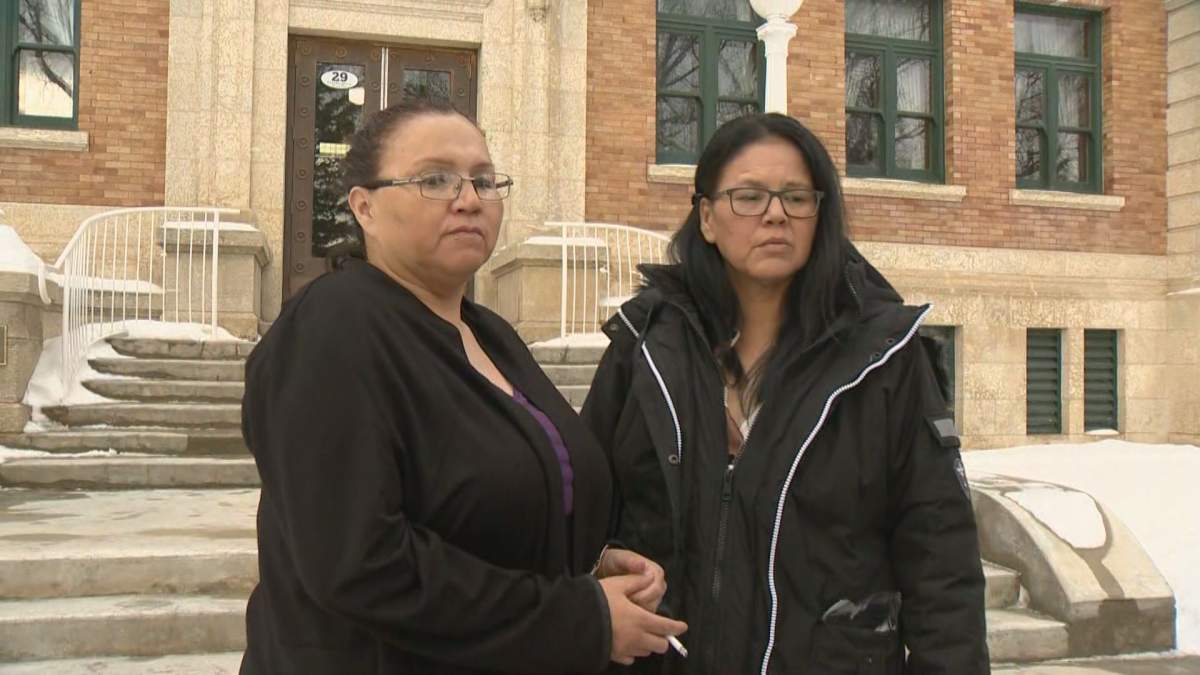UPDATE- A week after hearing arguments at a Yorkton courthouse, Justice Donald Layh denied the Crown’s publication ban request, which they argued was needed to ensure a jury pool wouldn’t be tainted, if a federal review determines the sisters should have a new trial.

“I find that any risk to justify publication ban is scant and speculative,” Layh wrote in his 30-page reasons. “The obvious reality is that much of the Quewezance case has long been accessible to the public, making a publication ban largely superfluous.”
The Quewezance sisters are set to return to court Jan. 24 seeking freedom while a federal conviction review takes place — which could take months or years.
It was a bittersweet moment for two Saulteaux sisters from the Keeseekoose First Nation after reuniting after 18 years outside a Yorkton courthouse where in 1994, they were sentenced to life in prison for a murder to which someone else eventually confessed.

Wearing ribbon skirts, Odelia and Nerissa Quewezance hugged outside the courthouse, savouring the moment of being in each other’s presence again.
“I was a bit overwhelmed,” said Nerissa. “In a sense, I feel like … I kind of lost touch with my family. Like, I need to get to know (my sister) again.”
Odelia was shocked to see her younger sister and it was a moment they both will remember.
“I know when she leaves, I know it’s going to kick in and I’m going to cry because we have to leave again,” she said.

Get daily National news
“We’re both strong in my mind, but, you know, it’s hard … I’m pretty sure everybody goes through this. We’re happy here on the outside, but inside we’re hurting.”
The Quewezance sisters spent nearly 30 years in jail for the death of a Kamsack farmer in 1993. They pleaded not guilty to second degree murder but were convicted in 1994 and continue to maintain their innocence.
Farmer Anthony Joseph Dolff, 70, was murdered in his farmhouse near Kamsack three hours northeast of Regina, after a drinking party he hosted with the sisters and their cousin, who was a youth at the time.
Court records obtained by APTN News, which broke the story in 2020 showed that Dolff was stabbed 17 times, twice in the heart, strangled with a phone cord and had a television thrown onto his head.
Both sisters insisted they didn’t see or the murder or commit it.
A new confession came later, when a youth pleaded guilty to second-degree murder in 1995 and served five years in youth jail.
APTN reporter Kathleen Martens was at the court hearing on Thursday. She said the Quewezance sisters are trying to be released on bail while the federal government reviews their case to see if there may have been a miscarriage of justice.
“The Saskatchewan prosecutor has asked for publication ban on the information that will come out at the bail hearing,” said Martens. “The women have asked to be freed while their cases are reviewed, which can take up to two years. So, they (asked to be) put on bail on conditions while the investigation goes on instead of having to sit another two years in prison.”
The Quewezance sisters are represented by James Lockyer, a prominent wrongful conviction lawyer in Canada. Martens said on the morning of the court hearing that the media is not only important but has been instrumental in many wrongful conviction cases in Canada.
“They believe publicity about the case is helping bring awareness about the overrepresentation of Indigenous women in prisons and as well how they may have been wronged as young women by the Saskatchewan justice system,” said Martens.
APTN and CBC are arguing against the ban.
“(Crown prosecutor Kelly Kaip) haven’t presented any evidence yet why they don’t want them to get bail, but they’ve said they don’t want any part of the bail hearing, or any court records released until the review is done,” said Martens.
The Canadian Association of Journalists says open courts and press freedoms are foundational to how effective democratic systems should work.
“Imposing restrictions that institute a proverbial ‘cone of silence’ prevents the public from properly scrutinizing the merits of the case,” said CAJ president Brent Jolly.
“This lack of transparency casts a dark shadow over the public’s right to know. The court must ask itself: Whose rights would be protected by imposing this publication ban?”
Meanwhile, Saskatchewan NDP MLA Nicole Sarauer asked Attorney General Bronwyn Eyre to step in. Her office said it “would be inappropriate to comment” as the matter is under federal review.
The judge has reserved his decision on the publication ban until next week. The sisters are set to appear for a bail hearing in January and whether media can attend and report on the proceeding depends on that ruling next week.










Comments